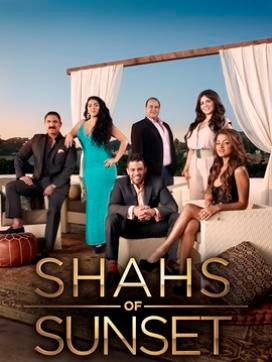
A painfully unappealing, unemployed woman in her late 30s with sumo wrestler thighs who wears 10-inch heels and a micro skirt to push around a pink stroller in which she carries her pair of Chihuahuas; a less unattractive, also unemployed woman in her late 30s who wears 10-inch heels and sequined tops to (I’m not kidding) target practice; a short, fat, bald real-estate developer who builds cheap houses and expects to sell them in the instant for millions of dollars; a gay real-estate broker with a thick black mustache who touts the extraordinary vigor of his “Persian” male organ; a (we presume) heterosexual (what else?) real estate broker with gelled hair, swollen biceps and a nose job badly in need of a nose job.
The sumo girl insists in every scene that she “refuses” to get married, though evidence of any prospects is entirely absent; the gunslinger shares with the camera her hatred of “ants and ugly people,” and HGH (human growth hormone) man sprays cologne inside his shorts and tells tall tales about how he used to be a millionaire.
That, ladies and gentlemen, about sums up the first episode of the much-dreaded “Shahs of Sunset,” purportedly about Los Angeles’ Iranian-American community, which premiered March 11 on Bravo. To say that it’s “Bad” would be a redundancy, given that it’s a so-called “reality show.” These days, even the most trusting television viewer knows there’s nothing “real” about reality TV. As Time magazine put it six years ago, “Quotes are manufactured, crushes and feuds constructed out of whole cloth, episodes planned in multi-act ‘storyboards’ before taping, scenes stitched together out of footage shot days apart.”
Everything — from the characters’ wardrobes, to their speech, to their relationships, and even their homes and cars and purported millions — is dreamed up by “story editors” (read underpaid, non-unionized writers) and show producers. Reality television is just a more cheaply made, hastily manufactured and badly acted soap opera. It’s meant to appeal to the audience’s basest instincts — racism, voyeurism, willingness to suspend intelligent thinking — and to remind its critics that viewers get what they deserve. If it’s possible to lower that bar, this show surely does it.
The “Worse,” in the case of “The Shahs,” is that the producers have gone out of their way to put together a cast of unattractive, unsophisticated, unproductive and — you’re going to have to believe me on this — most unrepresentative-of-the original characters possible. It’s true that this is one program, and therefore just one creator’s point of view, and that no single creation can be fairly expected to reflect the entirety of a community that, like any other, is varied and complex and multidimensional. But it’s also true that this is the first mainstream production about Iranians in Los Angeles; for it to succeed, viewers would have to believe that it’s a close-enough rendition of the lives of average Iranians. And it consists entirely of every negative stereotype floating around this city about the community. All the women here are vain, stupid and spoiled; all the men are vain, stupid and spoiled. To see these characters, one would never imagine that an Iranian could engage in any profession other than selling real estate, or speak about anything other than looks, money and sex. We all go around wearing a floor-length, black and gold lamé dress with long sleeves and ruffles on a Saturday morning when we’re just kicking back in our tiny apartment; we travel to a friend’s pool party with our wardrobe consultant, hair dresser and makeup artist in tow; we gouge the eyes out of anyone who dares suggest that we shop at H&M; and when our mother calls us at work, we interrupt a meeting, put her on speaker phone and let everyone in the room listen in on our conversation about Shabbat dinner.
As for the “Ugly”…
I’ve thought long and hard about this — whether I’m so reproving of the show because it displays a truth I do not like to see, or because it makes our younger generation feel embarrassed about their parents’ community and cultural background. Our children know, as well as anyone, that there’s a great deal of antipathy on the part of non-Iranians in Los Angeles toward the rest of us, that the entire community is often blamed for the mistakes of one, that our accomplishments and contributions are frequently overlooked and our shortcomings amplified and exaggerated. Portrayals such as the one in this show will only exacerbate such tensions.
But what offends me so much about “The Shahs” is not that it reflects a reality that may be difficult to acknowledge; it’s that it makes such an obvious effort to cast its characters in the worst possible light. Granted, these actors might not have needed much persuading; we all know that some people will do anything, even humiliate themselves, just to be on television. Then again, this may be understandable, or at least forgivable, in someone with little education and no other means of making a living or finding self-worth. In people who have been given every kind of opportunity, including, as all these characters assert, a Beverly Hills High School education, a warm and supportive community, and parents and grandparents who have moved mountains, escaped war and disease and revolution, given up their ancestral home and reinvented themselves and their lives so that children can make something worthwhile of themselves — in these people, such abdication of grace and elegance is, I’m afraid, plain old ugly.
First published in jewishjournal.com.
AUTHOR
Gina Nahai is an author and a professor of creative writing at USC. Her latest novel is “Caspian Rain” (MacAdam Cage, 2007). Her column appears monthly in The Journal.






